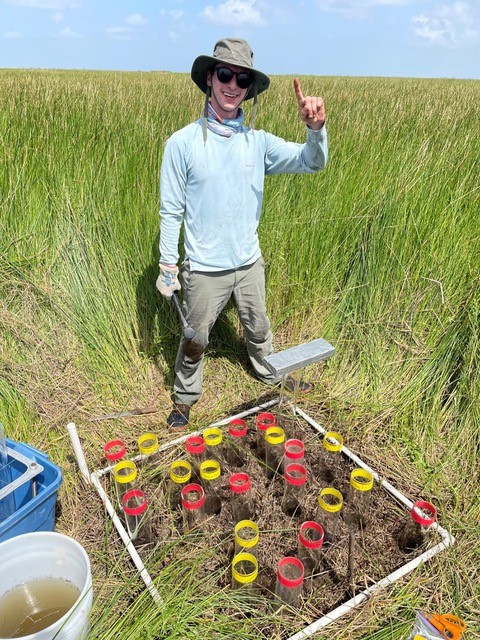Our Coast, Our Delta: In Barataria Bay, LSU Researchers Track the Effects of Sediment Diversion
May 31, 2023

Mercedes Pinzon
With construction of the recently approved Mid-Barataria Bay sediment diversion now on the horizon, LSU researchers have been at work in Barataria Bay, assessing the current ecosystem and building a better understanding of the potential effects of the upcoming sediment diversion.
LSU's College of the Coast & Environment's Wetland and Aquatic Biogeochemistry Laboratory, run by John White, the John and Catherine Day Professor in the Department of Oceanography & Coastal Sciences (DOCS), and Associate Dean of Research of CC&E, specializes in understanding cycling of nutrients and contaminants in a variety of water environments, including the wetlands of Barataria Bay.
Two of White’s Master’s students, Mercedes Pinzon and Robert Feder, will be presenting their findings about the potential effects of the sediment diversion on Thursday, June 1st. They will also both be presenting posters during the poster session.
Pinzon, who is from Panama, and also completed her Bachelor’s at CC&E, has been monitoring how nutrients from the Mississippi River will affect water quality in the Bay.
This research will help improve the water quality parameters used when predicting nutrient loading in coastal wetlands once they are restored—an essential component of projects outlined in the Coastal Master Plan.

Robert Feder
“The wetlands and the bay muds will all be able to take up much of the nitrogen and phosphorus from the river water, helping to maintain a healthy environment for our important fisheries,” Pinzon said. “This research will help Louisiana better predict what will happen when the Mississippi River is reconnected to the coastal basins.”
Feder, who is from Florida, has been examining water quality and ecosystem health through the lens of soil salinity. As freshwater sediment is released, the salinity of the wetlands will most likely go down. Feder will present findings on the health of the marsh as saline levels change.
“I have found that brackish marshes in Barataria Basin are fairly resilient against changing salinity conditions,” Feder said. “I believe my research has important ramifications for hydrologic restoration projects at home and abroad as people seek to restore freshwater flows to the coast.”
Pinzon and Feder will be presenting on Thursday, June 1, during Session 61, at 3:30. They will also present posters on their research during their poster session. John White will be moderating a discussion “Understanding Influences of Biogeochemical Cycles in the Coastal and Offshore Environments” at 1 p.m. on Wednesday, May 31, and presenting on “Project Successes and Ecosystem Impacts – Rivers and Swamps,” at 10 a.m. on Friday, June 2, in Room 205.


